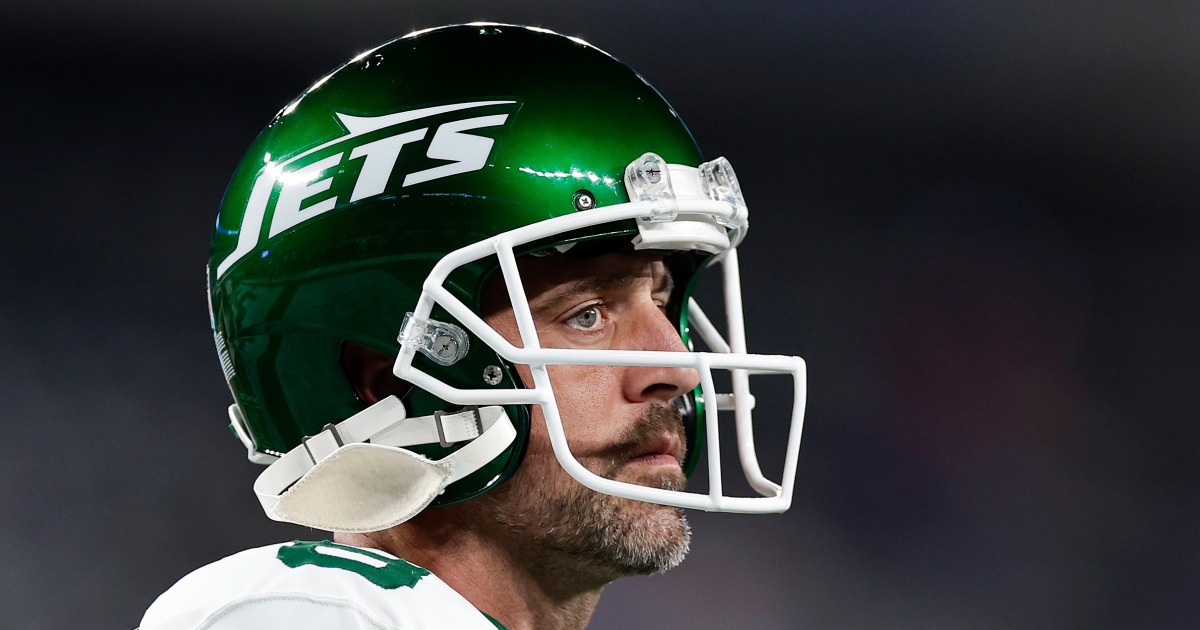
www.nbcnews.com
Why Achilles tears are so devastating, and what's ahead for Aaron Rodgers
Tearing an Achilles tendon — the injury Jets quarterback Aaron Rodgers suffered on Monday — is a major blow for an athlete. Here's what's ahead for Rodgers.
Sports
Tearing an Achilles tendon is one of the most devastating injuries a high-level athlete can suffer, three orthopedic doctors said — so New York Jets quarterback Aaron Rodgers faces a challenging recovery ahead.
Rodgers, whose arrival to the beleaguered franchise was one of the NFL’s most celebrated off-season moves, went down in a heap during “Monday Night Football.”
The NFL on Tuesday confirmed that Rodgers had torn his Achilles, an injury that’ll sideline him for the rest of the season and possibly longer.
The Achilles tendon connects the muscles in the back of the calf to the heel. Tears are usually painful and can affect a person's ability to walk.
“It allows you to push off. If you want to run, to jump, to push your foot and ankle down, take a ballerina position, explode out of the gate, it allows you to do all those things,” said Dr. Balazs Galdi, an orthopedic specialist who teaches at Rutgers New Jersey Medical School.
“It pretty much does everything," Galdi continued. "Not one thing, nothing, can be done without it.”
Rodgers will undergo surgery to mend the rupture, his coach said Tuesday.
Extensive physical therapy and rehab will follow, since the injury and ensuing surgery will lead to muscle atrophy and a loss of strength. It may be a full year before Rodgers can return to action.
The quarterback was carted off the MetLife Stadium turf after just four snaps during his Jets debut, then limped into the locker room with a boot wrapped around his lower left leg.
Former Jets starter Zach Wilson replaced him, and New York went on to win in overtime, 22-16.
Shortly after Rodgers left the game, the Jets announced that X-rays of his leg were negative. But Dr. Spencer Stein, a sports orthopedic surgeon at NYU Langone, said he knew an X-ray would not tell the whole story.
“In a sense it’s good because there’s no fracture,” Stein said. “But at the same time, these ligament injuries are hard. There’s an old adage that’s somewhat true: that bones heal reliably but soft tissues and ligaments are harder to heal.”
The NFL Network and Pro Football Talk were the first to report Rodgers' diagnosis on Tuesday.
Rodgers isn't the first Jets QB to suffer this injury.
In the 1999 opener, Vinny Testaverde, then 35, ruptured his Achilles tendon and didn’t play the rest of that season.
Testaverde eventually recovered, and he helped the Jets to multiple playoff appearances before hanging up his cleats.
Stein said medical technology is constantly improving, and Rodgers' recovery could be helped by the fact that the injured leg is his left — not the one Rodgers uses to plant and throw.
"Everybody is different, but with the right therapy and post-operative course and attention, they can do well," Stein said. "The surgical techniques are better, more minimally invasive, the suture material is stronger now than 10 years ago. So there are advancements that can bode well."
Still, it's nearly impossible to predict how well Rodgers will recover.
"There’s a lot of factors at play here," said Dr. Brandee Waite, director of sports medicine at the University of California, Davis Health.
"Even in fantastic surgical hands and with a very dedicated athlete to a rehab program, sometimes you hit the jackpot and get a full recovery, and sometimes you don’t," said Waite, whose clinic is located about halfway between Berkeley, California — where Rodgers rose to prominence as a college football star — and his hometown of Chico.
Rodgers' recovery could be especially difficult if the Achilles tear came in tandem with other nagging injuries or ailments, such as arthritis or nerve damage, though no such problems are publicly known.
“We’re not privy, nor should we be, to all of their ongoing medical issues," Waite said of NFL stars. "We don’t always know the whole story with what’s going on with any athlete.”
Yet another complicating factor for Rodgers could be his age. The quarterback turns 40 in December, so his recovery may be slower and the threat of re-injury greater than a younger athlete's would be.
"The chances of getting back from this injury are much easier when you are younger. When you're a little bit older, the odds are against you," Galdi said.
"It's not impossible, but it's certainly much more difficult. Your body in general, your muscles and tendons are just not as healthy," he added. "Forty is young. But for a high-level athlete, 40 is old — 40 is what 70 would be for us."
























































